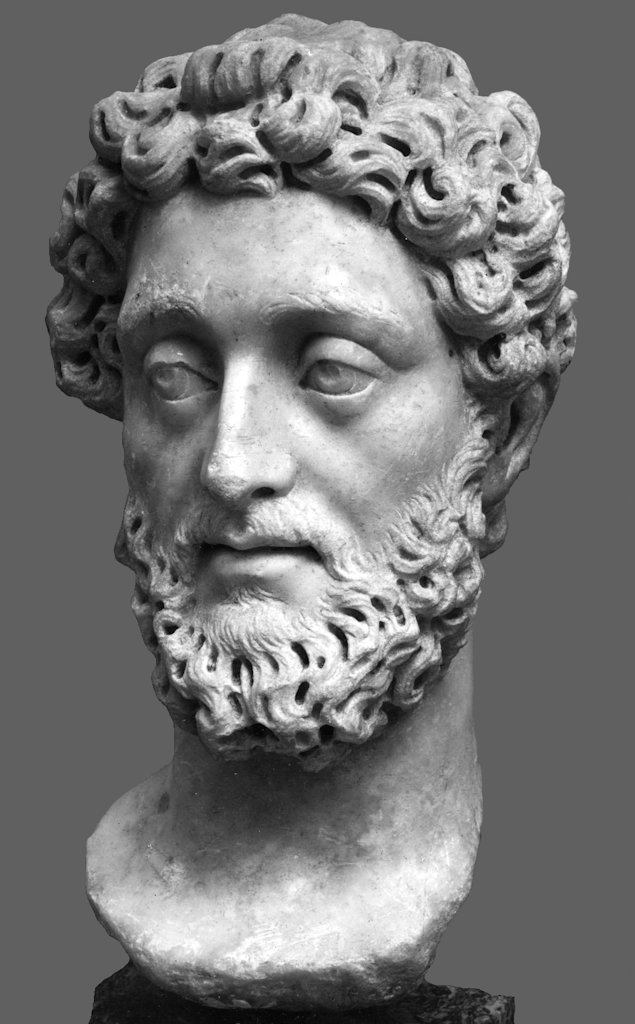Honours to Commodus
On the vault of the main entrance corridor of the theatre is a stucco relief of Victoria crowning Hercules. Commodus associated himself emphatically with Hercules, so that the hero is here presumably to be understood as Hercules-Commodus. In 1856 Pietro Ercole Visconti reported the stamp Colonia Felix Commodiana ("the happy colony of Commodus") on a lead water pipe found in Ostia. Commodus also gave Carthage his name, and planned to do the same with Rome. This raises the question of the attitude of the people in Ostia towards the Emperor. A graffito gives a first indication. Commodus had renamed a month, August or perhaps September, to Commodus. This name was used in the graffito (ante diem) VII K(a)L(endas) COMMODAS, July 26th or August 26th, in the House of Jupiter and Ganymede. After the death of Commodus the original name of the month was used again.[1]
The graffito VII K L COMMODAS in the House of Jupiter and Ganymede (the photo shows the right part only).
Photo: Bob Harp. Drawing: T. Jenkins / W. Loerts.A portrait of Commodus made not long before his death was found in the House of the Wine Bar. On the head were once five bronze sun rays, associating Commodus with Sol. The small size of the head suggests that it comes from a private shrine or the seat of a guild.

Small portrait of Commodus (h. 0.24). Excavated in 1915 in the House of the Wine Bar.
Commodus is associated with Sol, witness five holes for bronze sun rays in the hair.
Around 190 AD. Museo Ostiense. Scavi di Ostia IX, nr. 23. Photo: ICCD E027253A.In the years 181-185 AD Commodus was honoured by a member of a guild of ferrymen.[2] In and near the Barracks of the Fire Brigade fragments were found of a dedication for the well-being of Commodus by the vigiles, made in 190 AD.[3] A dedication by a freedman of Commodus cannot be dated more precisely than 180-192 AD:
PRO SALVTE [---]
M(arci) AVR(eli) COMMODI
ANTONINI AVG(usti) [---]
M(arcus) AVR(elius) AVG(usti) LIB(ertus)
ARMENTARIVS
[---]
D(ono) D(edit)For the well-being
of Marcus Aurelius Commodus
Antoninus Augustus,
Marcus Aurelius, freedman of the Emperor,
Armentarius
---
offered this gift.EDR163543. After his death Commodus was declared a public enemy by the Senate, and surely many dedications to him will then have been destroyed. Reactions to his murder may have been mixed however, and in 197 AD he was deified at the instigation of Septimius Severus, who argued for Commodus in the Senate. In his speech he referred to an event that took place in Ostia, most likely during the inauguration of the theatre in 196 AD:
While reading to the senate a speech, in which he [Septimius Severus] praised the severity and cruelty of Sulla, Marius and Augustus as the safer course and deprecated the mildness of Pompey and Caesar as having proved the ruin of those very men, he introduced a sort of defence of Commodus and inveighed against the senate for dishonouring that emperor unjustly, in view of the fact that the majority of its members lived worse lives. "For if it was disgraceful," he said, "for him with his own hands to slay wild beasts, yet at Ostia only the other day one of your number, an old man who had been consul, was publicly sporting with a prostitute who imitated a leopard. But, you will say, Commodus actually fought as a gladiator. And does none of you fight as a gladiator? If not, how and why is it that some of you have bought his shields and those famous golden helmets?" Cassius Dio, Roman History 76,8,2. Translation E. Cary.
The dedicatory inscription of the theatre from 196 AD. The white fragments belong to the original inscription.
Photo: Klaus Heese.
(1) Commodus giving his name to Carthage and Rome: Historia Augusta, Commodus 8,6-9 and 17,8. The month Commodus: Cassius Dio, 73,15,3.
(2) EDR080267.
(3) EDR106370.